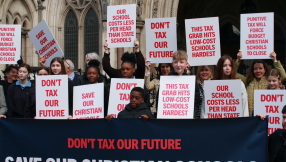Another diocese leaves US Episcopal Church
The Diocese of South Carolina, headed by Bishop Mark Lawrence, made the announcement Wednesday, making it the fifth diocese to secede from the mainline Protestant denomination since 2006.
The Rev D. Kendall S Harmon, Canon Theologian with the Diocese of South Carolina, told The Christian Post that the decision to defect was based on The Episcopal Church's actions against Bishop Lawrence.
"The Episcopal Church took unnecessary and illegitimate action against us which triggered our own previously agreed upon actions and caused us to withdraw to protect ourselves and our Gospel witness," said Harmon.
The Rev Canon Jim Lewis, spokesman for the diocese, explained to The Christian Post that there "is no explicitly described process in the national canons of the Church" regarding the process of dismissal for a diocese.
"Our Diocesan canons give the Bishop the absolute authority to interpret the canons. At the express written request of the Standing Committee, our bishop was asked to answer that question," said Lewis. "His determination ruled that the Board of Directors of the Diocese does indeed have the authority to make that decision on behalf of the Diocese."
Neva Rae Fox, public affairs officer with The Episcopal Church, commented: "Many are saddened by the recent events in the Diocese of South Carolina and the actions taken by the Bishop that led up to the decision by the Disciplinary Board to certify the bishop's abandonment of the Church.
"As has been stated previously, dioceses may not leave the Episcopal Church. Even if leaders and individual members of congregations choose to leave, those who remain continue as members of the Episcopal Church and leader of their dioceses."
Last October, The Episcopal Church accused Bishop Lawrence, bishop of seeking to leave the denomination due to differences over the issue of homosexuality.
Lawrence had criticised The Episcopal Church's pro-gay positions, leading some to conclude that he sought to defect from the denomination. By late November, the Disciplinary Board for Bishops cleared Lawrence of two of the three charges.
However, on Monday Lawrence was informed by Episcopal Presiding Bishop Katharine Jefferts Schori that he was found guilty of the charge of "abandonment of the communion of the church".
Jeff Walton, Anglican Programme director at the Institute on Religion & Democracy, told The Christian Post that the decision to leave was "the outcome of Episcopal Church officials' vendetta against Bishop Mark Lawrence".
"The diocese has many options ahead of it, but staying within The Episcopal Church ceased to be one of those options as soon as the national church decided to inhibit – and no doubt soon depose – Bishop Lawrence," said Walton.
"With over 29,000 members, the Diocese of South Carolina is both large and growing. It is a rare bright spot within a denomination that lost almost a quarter of its attendance in the past decade."
Walton also told CP that he believed the effort of the South Carolina diocese to defect from the denomination will be met with legal battles, as with past congregations that have opted to leave.
"Litigation over diocesan property is inevitable. That being said, the South Carolina Supreme Court established in a previous court case that an internal church rule – naming all parish property held in trust for the wider church – is invalid in that state," said Walton.
"Since Bishop Lawrence – in response to that court ruling – already provided quit claim deeds to each parish, there seems little that the national church will be able to do to retain individual parishes and their properties."
The Episcopal Church has one other diocese, the Diocese of Upper South Carolina, located in the Palmetto State.
The Diocese of South Carolina is the fifth diocese to defect from The Episcopal Church. In 2006 and 2007, four dioceses located in California, Illinois, Pennsylvania, and Texas severed their ties with the denomination, eventually joining with other groups to form the Anglican Church in North America.
Lewis said there were no plans to join a different Anglican church.
"All our plans have been focused upon the protection of the diocese. We have pursued those steps we felt necessary in order with integrity to remain who we are as a diocese within The Episcopal Church," he said.
"The Bishop has sacrificed considerably to keep the Diocese intact and in TEC. Until this action by The Episcopal Church, that has remained possible, if increasingly difficult."













